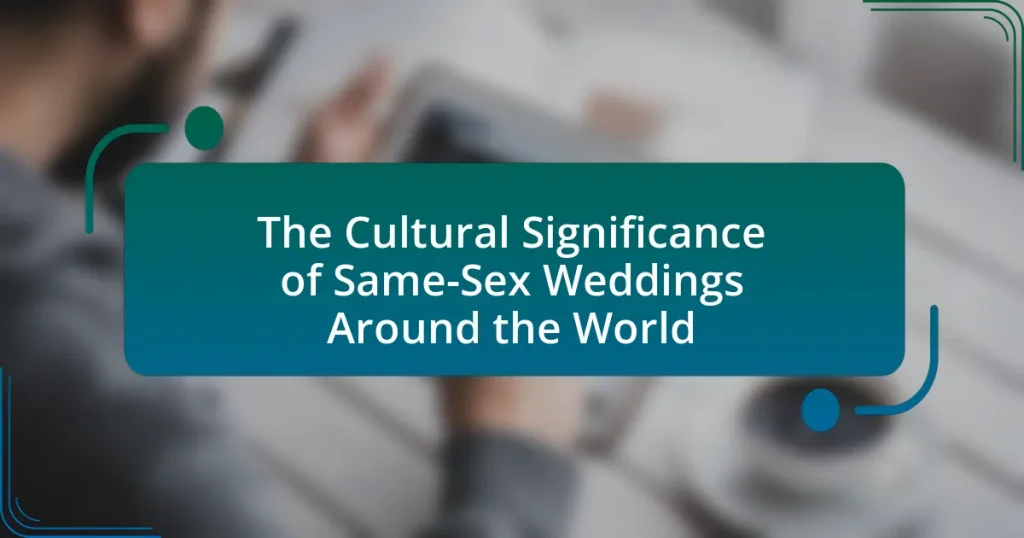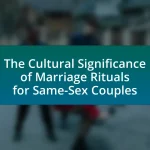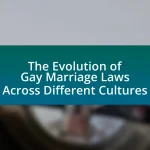Same-sex weddings are significant cultural events that symbolize the recognition and acceptance of LGBTQ+ rights worldwide. They challenge traditional marriage norms, promote inclusivity, and reflect evolving societal values regarding sexual orientation. The article explores how same-sex weddings vary across cultures, the role of traditions in these ceremonies, and the impact of legal recognition on social acceptance. It also addresses the challenges faced by same-sex couples in different regions, the historical context of same-sex marriage, and how these weddings can inspire change in traditional wedding practices while fostering community support and inclusivity.

What is the cultural significance of same-sex weddings around the world?
Same-sex weddings hold significant cultural importance globally as they symbolize the recognition and acceptance of LGBTQ+ rights and identities. In many societies, these weddings challenge traditional norms surrounding marriage, promoting inclusivity and equality. For instance, countries like Canada and the Netherlands, which were among the first to legalize same-sex marriage, have seen positive shifts in public attitudes towards LGBTQ+ individuals, reflecting broader societal changes. Additionally, same-sex weddings often serve as a platform for advocacy, raising awareness about discrimination and fostering dialogue about human rights. The cultural significance is further underscored by the increasing visibility of LGBTQ+ relationships in media and public life, which contributes to normalizing these unions and affirming the legitimacy of diverse family structures.
How do same-sex weddings reflect cultural values and beliefs?
Same-sex weddings reflect cultural values and beliefs by challenging traditional notions of marriage and promoting inclusivity and equality. These ceremonies often symbolize a shift in societal attitudes towards LGBTQ+ rights, showcasing a growing acceptance of diverse sexual orientations. For instance, the legalization of same-sex marriage in countries like the United States in 2015, following the Supreme Court ruling in Obergefell v. Hodges, illustrates a significant cultural transformation that aligns with values of individual freedom and human rights. Additionally, same-sex weddings often incorporate cultural traditions, thereby reinforcing the idea that love and commitment transcend gender norms, further embedding these evolving beliefs into the fabric of society.
What role do traditions play in same-sex wedding ceremonies?
Traditions play a significant role in same-sex wedding ceremonies by providing cultural context and a sense of legitimacy to the union. Many same-sex couples incorporate traditional elements from their respective cultures or religions to honor their heritage and create a meaningful ceremony. For instance, some couples may include rituals such as exchanging rings, lighting candles, or performing unity ceremonies, which are common in heterosexual weddings. These traditions help to affirm the couple’s commitment and celebrate their love in a way that resonates with their backgrounds. Additionally, the inclusion of traditional practices can foster acceptance within families and communities, as it aligns the same-sex union with established cultural norms.
How do different cultures perceive same-sex relationships?
Different cultures perceive same-sex relationships in varied ways, influenced by historical, religious, and social factors. In many Western cultures, such as those in North America and parts of Europe, same-sex relationships have gained increasing acceptance, with legal recognition of same-sex marriage in countries like the United States since 2015 and in Germany since 2017. Conversely, in many Middle Eastern and African cultures, same-sex relationships are often stigmatized and can be subject to legal penalties, reflecting deeply rooted religious beliefs and traditional values. For instance, countries like Saudi Arabia impose severe punishments for homosexuality, while in contrast, South Africa recognizes same-sex marriage and has constitutional protections against discrimination based on sexual orientation. This cultural divergence highlights the complex interplay between societal norms and the acceptance of same-sex relationships globally.
Why are same-sex weddings important for LGBTQ+ rights?
Same-sex weddings are important for LGBTQ+ rights because they symbolize legal recognition and equality under the law. This recognition affirms the dignity and legitimacy of same-sex relationships, contributing to broader societal acceptance. For instance, the legalization of same-sex marriage in countries like the United States in 2015, through the Supreme Court case Obergefell v. Hodges, marked a significant milestone in the fight for LGBTQ+ rights, ensuring that same-sex couples have the same legal protections and benefits as heterosexual couples. This legal acknowledgment not only empowers individuals but also fosters a more inclusive society, challenging discrimination and promoting equal rights for all.
How do same-sex weddings contribute to social acceptance?
Same-sex weddings contribute to social acceptance by normalizing diverse relationships and challenging traditional norms. When same-sex couples publicly celebrate their unions, it fosters visibility and representation, which can reduce stigma and promote understanding within society. Research indicates that regions where same-sex marriage is legalized experience a decrease in anti-LGBTQ+ attitudes; for example, a study published in the American Journal of Public Health found that legalizing same-sex marriage in the U.S. was associated with a significant reduction in suicide rates among LGBTQ+ youth. This evidence underscores how same-sex weddings can play a pivotal role in advancing social acceptance and equality.
What impact do legal recognitions of same-sex marriages have on society?
Legal recognition of same-sex marriages positively impacts society by promoting equality and reducing discrimination. Studies show that legalizing same-sex marriage leads to increased acceptance of LGBTQ+ individuals, fostering a more inclusive environment. For instance, research published in the Journal of Marriage and Family indicates that states in the U.S. that legalized same-sex marriage experienced a significant decrease in anti-LGBTQ+ hate crimes. Furthermore, legal recognition provides same-sex couples with access to essential rights and benefits, such as healthcare and tax advantages, which contribute to their economic stability and overall well-being. This societal shift not only enhances the lives of LGBTQ+ individuals but also encourages broader cultural acceptance and understanding.
What are the historical contexts of same-sex weddings globally?
Same-sex weddings have a diverse historical context that varies significantly across different cultures and time periods. In ancient civilizations, such as Greece and Rome, same-sex relationships were often accepted, with some evidence of same-sex unions being celebrated in various forms. For instance, in ancient Rome, the concept of “affectionate unions” between men was recognized, although not formalized as marriage.
In contrast, during the Middle Ages in Europe, same-sex relationships were largely condemned by the Christian Church, leading to persecution and criminalization. However, some cultures, such as the Native American Two-Spirit tradition, recognized and honored same-sex relationships, integrating them into their spiritual and social frameworks.
The modern movement for same-sex marriage began in the late 20th century, gaining momentum in the 21st century. The Netherlands became the first country to legalize same-sex marriage in 2001, setting a precedent that many other nations followed. As of 2023, numerous countries, including Canada, Spain, and South Africa, have recognized same-sex marriage, reflecting a significant shift in societal attitudes towards LGBTQ+ rights.
This historical evolution illustrates the complex interplay between cultural acceptance, legal recognition, and the ongoing struggle for equality in the context of same-sex weddings globally.
How have attitudes towards same-sex weddings evolved over time?
Attitudes towards same-sex weddings have evolved significantly over time, shifting from widespread opposition to increasing acceptance. In the late 20th century, same-sex relationships were often stigmatized, and legal recognition of same-sex marriages was virtually nonexistent. However, by the early 21st century, many countries began to legalize same-sex marriage, reflecting changing societal norms. For instance, the Netherlands became the first country to legalize same-sex marriage in 2001, setting a precedent that influenced other nations. By 2023, numerous countries, including the United States, Canada, and many European nations, recognized same-sex marriages, indicating a substantial cultural shift towards acceptance and equality. Public opinion polls have shown a marked increase in support for same-sex marriage, with a 2021 Gallup poll indicating that 70% of Americans favored legal recognition for same-sex couples, up from just 27% in 1996. This evolution illustrates a broader trend towards inclusivity and recognition of LGBTQ+ rights globally.
What historical events have influenced the acceptance of same-sex weddings?
The acceptance of same-sex weddings has been significantly influenced by key historical events such as the Stonewall Riots of 1969, which marked a pivotal moment in the LGBTQ+ rights movement in the United States. The riots catalyzed activism and visibility for LGBTQ+ individuals, leading to increased advocacy for marriage equality. Additionally, the legalization of same-sex marriage in the Netherlands in 2001 set a precedent, inspiring other countries to follow suit. The U.S. Supreme Court’s ruling in Obergefell v. Hodges in 2015, which recognized same-sex marriage as a constitutional right, further solidified this acceptance. These events collectively contributed to a cultural shift towards recognizing and legitimizing same-sex relationships globally.
How do same-sex weddings vary across different cultures?
Same-sex weddings vary significantly across different cultures, reflecting diverse societal attitudes and legal frameworks. In countries like the Netherlands and Canada, same-sex marriage is legally recognized and celebrated with similar customs to heterosexual weddings, including formal ceremonies and receptions. Conversely, in cultures where same-sex relationships are stigmatized or illegal, such as in parts of Africa and the Middle East, same-sex weddings may occur in secrecy or take the form of symbolic ceremonies without legal recognition. Additionally, some Indigenous cultures, such as certain Native American tribes, have historically embraced two-spirit individuals, allowing for unique marriage customs that honor same-sex unions. These variations illustrate how cultural, legal, and social factors shape the expression and acceptance of same-sex weddings globally.
What are some unique traditions in same-sex weddings in various countries?
Same-sex weddings feature unique traditions that vary by country, reflecting cultural significance and local customs. In India, for example, same-sex couples may participate in a “Saptapadi” ceremony, where they take seven steps together, symbolizing their commitment, similar to traditional Hindu weddings. In Mexico, some couples incorporate a “Lazo” ceremony, where a rope or cord is placed in a figure-eight shape around the couple, representing unity. In Sweden, same-sex weddings often include a “Vigsel” ceremony, where couples exchange rings and vows in a manner akin to heterosexual weddings, emphasizing equality. These traditions highlight the evolving acceptance and celebration of same-sex unions across diverse cultures.
How do cultural differences affect the celebration of same-sex weddings?
Cultural differences significantly influence the celebration of same-sex weddings by shaping societal acceptance, legal recognition, and traditional practices. In countries where same-sex marriage is legally recognized, such as Canada and the Netherlands, celebrations often mirror those of heterosexual weddings, including elaborate ceremonies and receptions. Conversely, in cultures with strong opposition to same-sex relationships, such as in parts of Africa and the Middle East, same-sex weddings may be clandestine or entirely unrecognized, leading to simpler, private celebrations or even the avoidance of formal ceremonies altogether. For instance, a 2020 study published in the Journal of Homosexuality highlights that in cultures with high levels of homophobia, same-sex couples often face significant barriers, including social ostracism and legal repercussions, which directly impacts how they celebrate their unions. Thus, cultural context plays a crucial role in determining the visibility, acceptance, and nature of same-sex wedding celebrations globally.
What challenges do same-sex couples face in different regions?
Same-sex couples face various challenges across different regions, primarily influenced by cultural, legal, and social factors. In regions where same-sex marriage is illegal, such as many parts of Africa and the Middle East, couples often encounter legal discrimination, lack of recognition, and potential criminalization of their relationships. For instance, in countries like Uganda and Nigeria, laws against homosexuality can lead to imprisonment or violence against LGBTQ+ individuals.
In contrast, regions with legal recognition, such as parts of Europe and North America, still present challenges like social stigma, discrimination in employment, and healthcare disparities. Studies indicate that even in progressive areas, same-sex couples may experience microaggressions and exclusion from family and community events, impacting their mental health and social well-being.
Additionally, cultural attitudes towards LGBTQ+ individuals can vary significantly, affecting acceptance and support. For example, in some Asian cultures, traditional values may conflict with LGBTQ+ identities, leading to familial rejection and societal ostracism. Overall, the challenges faced by same-sex couples are multifaceted and deeply rooted in the legal and cultural landscapes of their respective regions.
How do legal restrictions impact same-sex weddings in certain countries?
Legal restrictions significantly hinder same-sex weddings in certain countries by prohibiting marriage equality and enforcing discriminatory practices. For instance, in countries like Saudi Arabia and Iran, same-sex relationships are criminalized, leading to severe penalties, including imprisonment or even death. These legal barriers not only prevent same-sex couples from legally marrying but also contribute to societal stigma and discrimination, impacting their social recognition and rights. In contrast, countries that have legalized same-sex marriage, such as Canada and the Netherlands, demonstrate increased acceptance and support for LGBTQ+ rights, highlighting the profound influence of legal frameworks on cultural attitudes towards same-sex weddings.
What social stigmas do same-sex couples encounter during weddings?
Same-sex couples encounter several social stigmas during weddings, including discrimination, lack of acceptance from family and friends, and societal judgment. Discrimination can manifest in the form of exclusion from traditional wedding venues or services that refuse to cater to same-sex couples. Additionally, some family members may express disapproval or withdraw support, leading to emotional distress for the couple. Societal judgment often arises from deeply ingrained cultural norms that view heterosexual unions as the standard, resulting in negative perceptions and comments directed at same-sex couples. Studies indicate that these stigmas can lead to increased stress and anxiety for same-sex couples planning their weddings, highlighting the ongoing challenges they face in seeking acceptance and recognition.
How can same-sex weddings promote inclusivity and diversity?
Same-sex weddings promote inclusivity and diversity by challenging traditional norms and expanding societal acceptance of varied sexual orientations. These ceremonies serve as public affirmations of love and commitment, fostering a culture that values all relationships equally. Research indicates that regions with legalized same-sex marriage experience increased acceptance of LGBTQ+ individuals, as seen in a 2019 study published in the Journal of Marriage and Family, which found that legal recognition of same-sex unions correlates with reduced discrimination and enhanced social integration. By normalizing diverse expressions of love, same-sex weddings contribute to a broader understanding of family and partnership, ultimately enriching the social fabric.
What role do same-sex weddings play in fostering community support?
Same-sex weddings play a crucial role in fostering community support by promoting inclusivity and acceptance within society. These ceremonies serve as public affirmations of love and commitment, which can challenge societal norms and encourage dialogue about LGBTQ+ rights. Research indicates that communities that celebrate same-sex weddings often experience increased social cohesion and support networks, as evidenced by a study published in the Journal of Marriage and Family, which found that areas with legal same-sex marriage saw a significant rise in community engagement and support for LGBTQ+ individuals. This demonstrates that same-sex weddings not only celebrate individual unions but also contribute to broader societal change by fostering a more supportive and inclusive environment.
How can same-sex weddings inspire change in traditional wedding norms?
Same-sex weddings can inspire change in traditional wedding norms by challenging established gender roles and promoting inclusivity. These ceremonies often prioritize personal expression and authenticity over conventional expectations, encouraging couples to design their weddings in ways that reflect their unique identities and values. For instance, the rise of same-sex marriage has led to a broader acceptance of diverse wedding styles, such as non-religious ceremonies and alternative venues, which were previously less common. Research from the Williams Institute indicates that the legalization of same-sex marriage has not only increased visibility for LGBTQ+ relationships but has also influenced societal perceptions of marriage, leading to a more inclusive understanding of love and partnership. This shift in perspective can ultimately reshape traditional wedding practices, making them more adaptable and representative of varied cultural and personal narratives.
What best practices can be adopted for planning inclusive same-sex weddings?
To plan inclusive same-sex weddings, it is essential to prioritize representation and respect for diverse identities throughout the planning process. This includes selecting vendors who are LGBTQ+ friendly, ensuring that all language used in invitations and ceremonies is inclusive, and considering the unique cultural backgrounds of the couples involved. Research indicates that 70% of LGBTQ+ couples prefer vendors who openly support their community, highlighting the importance of inclusivity in vendor selection. Additionally, incorporating symbols and traditions that resonate with both partners can enhance the personal significance of the ceremony, fostering a sense of belonging and celebration.


